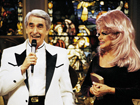 |
||||||||||
 |
||||||||||
|
Tackling the Teflon televangelists Exasperated US journalist Mark Pinsky asks why, in spite of decades of detailed exposés, the faithful remain happy to be fleeced by TV preachers begging for their born-again bucks. Faith and forbearance can sometimes be insurmountable barriers for religion journalists. When it comes to some true believers, I have learned, nothing you write that questions their idols seems to make any difference. I have been covering Trinity Broadcasting Network and its flamboyant founders, Paul and Jan Crouch, for nearly two decades. During that time, I have chronicled and investigated the inexorable rise of the world's largest Christian media empire for newspapers on both US coasts, in The Los Angeles Times and The Orlando Sentinel, as well as in chapters in several books. My detailed exposés in the Times have included the Crouches' heavy-handed, corner-cutting, and even cutthroat dealings with fellow Christians, as well as disputes between Trinity and the Federal Communications Commission and evangelical trade groups such as the National Religious Broadcasters (NRB). In part because of my reporting, Trinity withdrew from the NRB and was stripped of its Miami television affiliate because of what the FCC charged was misrepresentation of minority ownership. I revealed dubious Trinity practices, for example, ordaining affiliate station managers (often Crouch relatives) in order for them to qualify for parsonage allowance tax breaks – and also, Paul Crouch's practice of cozying up to third world military dictators, such as Guatemala's Efraim Rios Montt, and puppets of the apartheid-era South African government, such as General Bantu Holomisa of Transkei, in order to build television stations there. I was not alone. Both cable and network news programs have also taken passes at Trinity, with no discernible result. In 2004, William Lobdell, who succeeded me at the Times, covering religion in Orange County, broke a story that Trinity had paid a $425,000 settlement to a man who claimed that Paul Crouch had a sexual encounter with him in 1996. In the end, none of this adverse publicity mattered. Nothing of this coverage has slowed Trinity's rise; we in the media huffed and we puffed and we did not blow their house down. Today, thanks to 67 satellites, Trinity spans the globe and is worth roughly one billion dollars. There are outspoken critics of the huge salaries and lavish lifestyles of some preachers from within the evangelical community. "The opulent lifestyles of televangelists make me sick," said Rick Warren, who has returned all the salary he has ever taken from Saddleback Church, in Orange County, California. Warren accepts no speaking honoraria, and "reverse tithes," giving away 90 percent of the millions of dollars he has earned from his bestselling books, including The Purpose Driven Life. "I want to stay so far away from that stuff, that I've never personally met any of those folks, so they can't claim to know me." But more than anything, it seems to me, my experience of covering the Crouches demonstrates the limits of journalism in matters of faith. "Within conservative media ministries, criticism from outsiders often is seen as a badge of honor that validates a ministry's righteousness," says Quentin Schultze, author of Christianity and the Mass Media in America. "TV creates an especially strong, empathetic bond between high-profile media personalities and their audiences." "Loyal members of the audience feel like special insiders who trust the leaders even though they have never met such leaders in person," says Schultze, who is on the faculty of Calvin College, an evangelical institution. "It takes a major, persistent, public moral scandal to tarnish a leader's reputation and bring down a ministry." In the 1980s, the television ministries of Jimmy Swaggart and Jim and Tammy Bakker (once partners with the Crouches) were destroyed as a result of sexual misconduct and financial improprieties – resulting in at least one Pulitzer Prize. Standards have changed since then, to a degree. Extramarital affairs, sometimes followed by divorce and remarriage, are no longer automatic disqualifications for megachurch pastors and television ministers. The same is now true of drugs and alcohol. Now it is male homosexuality that is the one unforgivable sin for evangelical leaders, from which there is no effective return, Christian theology notwithstanding. Ask Ted Haggard about redemption and restoration. Oddly, even Paul Crouch's settlement of just such a lawsuit did not slow Trinity down. Sometimes, for journalists investigating televangelists, the best one can expect for vigorous coverage is for the subjects to pack up and move their base of operations outside your circulation area. Los Angeles Times coverage of Trinity and the Crouches keeps them on the road for much of the year, staying at some of the 30 homes the network owns around the country and the world. In Orlando, WKMG-TV's Tony Pipitone's determined financial scrutiny did the same thing to faith healer Benny Hinn, a Trinity regular, who decamped to Texas and Southern California. For me, covering Trinity and its founders for so long was not a matter of any unresolved vendetta or frustrated prize-hunting. In the 1980s, at the Times, it was an opportunity to cover a national story for my readers, on the heels of the Jim and Tammy Bakker PTL scandal. The only constraints I felt in reporting this story had to do with concerns about my ethnocentricity. I was writing from the perspective of a suburban, upper middle class Jew, but covering Pentecostals and their viewers who have their geographic roots in America's small towns and rural countryside, in the South and the heartland. Economically, they are often working and lower middle class. I did not want to imply that any of this made them gullible, rather than simply loyal. When I left California for Florida in 1995, I was relieved to leave Trinity and the Crouches behind. In 2007, however, the network bought a Christian television station in Orlando, and several months later purchased the Holy Land Experience, a failing Bible-based theme park near Universal Studios, Orlando. It seemed that Paul and Jan had followed me home. Rather than anticipation, I felt like Al Pacino's character in Godfather III, voicing frustration about his inability to extricate himself from the Mafia: "Just when I thought I was out, they pull me back in." Notwithstanding, I returned to the subject, analyzing the complex, $38 million deal for Holy Land. Despite public and private reassurance to longtime park employees, the Crouches, their extended family and assorted cronies, streamed through the park's replica of Jerusalem's gates like an invading horde, lopping dozens off the payroll and pillaging the park. On their first live broadcast from Holy Land, Jan mentioned that Jesus had once healed her pet chicken. The Crouches were, one laid-off staffer said, "a cross between The Sopranos and The Beverly Hillbillies." The TV analogies did not end there. In a grotesque parody of the reality show Extreme Makeover, Jan ordered modest furnishings ripped out, replaced with garish, tacky, and overpriced décor familiar to viewers of Trinity's signature Praise the Lord talk and variety show. One indiscreet, soon-to-be laid-off worker described the motif "early brothel." Again, Jan and Paul would not speak with me and, again, my Sentinel stories detailing these changes had no appreciable effect on their ministry. In a sense, the issue is moot. Age alone is moving the Crouches off the media scene. More to the point, their teary, teased, and blow-dried style of preaching and begging for money is passing out of style, eclipsed by younger, cooler personalities like Joel and Victoria Osteen, who prefer to buy time on broader-based commercial television outlets rather than building their own network. Sic transit gloria. Mark I. Pinsky is religion writer for The Orlando Sentinel and author of A Jew Among the Evangelicals: A Guide for the Perplexed. This article was first published in the Harvard Divinity Bulletin and reproduced with kind permission. |
|
|
|||||||||||||||||||||||||||||||
 |
||||||||||||||||||||||||||||||||||






